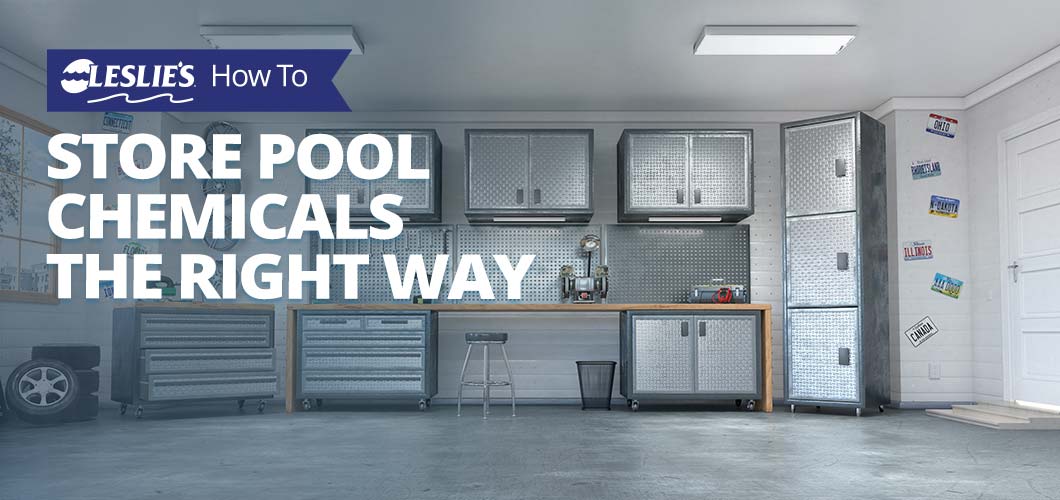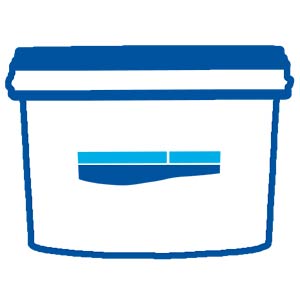
How to Store Pool Chemicals the Right Way
If you’ve ever read a pool chemical label, you know that it’s important to always store your chemicals in a cool, dry, well-ventilated area. But what you may not know are the more intricate details of safe pool chemical storage.
Considerations for Pool Chemical Storage
When choosing where and how to store your swimming pool chemicals, there are a few things to keep in mind. Before you can find the best place to set up your pool chemical storage area, you'll need to consider a few things. Factors include exposure to moisture, the average ambient temperature, the amount of ventilation available, proximity to other chemicals, and much, much more. This will keep your chemicals working effectively, and will help to avoid dangerous situations.
Below, you'll find some of the most common considerations for pool chemical storage. However, always read the warnings and storage instructions on each individual product label. This will help ensure you're storing your pool chemicals correctly.
Security

If your household has pets or young children, take extra care to keep the chemicals safely out of reach. That may be up high on a shelf with no climbable objects nearby. This could also be inside a lockable chemical cabinet or storage shed with a locking door. Eliminate the temptation of curiosity by keeping chemicals out of sight and out of reach at all times.
Bear in mind that the higher you store your chemicals, the greater the risk they'll fall and spill. But the lower you store your chemicals, the greater the safety risk for children and pets,especially if the chemicals aren’t locked up properly. In general, don't store pool chemicals above your head, and don't set them on the floor. Keep this in mind when deciding where — and how — to store your pool chemicals.
Moisture

It’s important to keep pool chemicals stored in a dry area, away from the pool.
When diluting chemicals prior to adding them to the pool, you always add chemicals to water, not water to chemicals. This is because adding moisture to dry chemicals can generate lots of heat quickly and/or release toxic gases, which may lead to a dangerous explosion, fire, or other health and safety hazard.
As we mentioned earlier, you may not want to store chemicals at floor level, especially if you have pets or children, or if there's a risk of flooding (natural or from appliances).
Also, if you have quite a bit of humidity in your area, you’ll want to make sure all lids are tightly sealed once you’re done adding chemicals to the pool.
When storing your pool chemicals in an outdoor storage cabinet, the cabinet should be covered to prevent water from getting in during heavy rainfall. Storage sheds should be weatherproof and ventilated — more on that below.
Temperature

By most definitions, storing chemicals in a “cool” area just means storing them at room temperature.
Don’t store chemicals somewhere where they’ll get too hot, even for brief periods. This means keeping your chemicals out of direct sunlight and/or out of storage containers placed in direct sunlight. That also means not leaving new chemicals in the trunk of your car for too long after you leave the pool store. Temperatures inside your vehicle can increase rapidly!
Likewise, if you live in a cooler climate, don't store chemicals where they'll be exposed to freezing temperatures. Even brief overnight freezing spells can ruin your chemicals.
For many pool owners, storing chemicals in a cool area means keeping them somewhere like the garage or basement. However, only store them here if you can lock them away in child-proof storage cabinets, as discussed in the first section. A lockable, well-ventilated storage location outside the home or attached garage is always preferred, and is highly recommended by most fire departments. However, that's not always feasible in all climates.
PRO TIP: Enzymes are especially vulnerable to high temperatures. If you’re storing pool enzymes, temperatures above 120ºF will cause the enzyme concentration to reduce considerably. Keep enzyme products indoors, if possible. If storing outdoors, make sure the temperature inside your storage area does not exceed the recommended temperature range indicated on the product label. The sun can make confined areas get hot very quickly!
Ventilation

Some pool chemical containers are vented to allow gases to escape, which is a large part of why ventilation is so important. In addition, loose product lids, open containers, and accidental chemical spills or reactions can release toxic fumes into the air. If your pool chemical storage area is tightly sealed with little or no ventilation, those fumes will rush out the next time you open the door, and you'll risk inhaling them. Fumes from oxidizers and strong acids can also corrode metal over time, especially when left in high concentrations in a poorly ventilated area.
If you choose an enclosed pool chemical storage option, make sure it has slots, gaps, or holes to allow adequate ventilation. Some lockable storage cabinets are made from expanded metal, offering the highest level of ventilation while still preventing unsupervised access. Even large outdoor storage sheds usually have some type of vent near the top to allow air flow. If storing your chemicals in a garage, your garage should have sufficient air circulation to prevent the buildup of fumes.
Proximity to Other Chemicals

No matter where you choose to store your chemicals, ALWAYS remember to keep your liquid and dry chemicals separate. In case of a spill or leak, having dry and liquid chemicals in close proximity can pose a serious threat of chemical reactions. If storing all your chemicals in the same cabinet or general area, keep the liquid chemicals on a lower shelf — NEVER store liquids above dry chemicals.
In addition, keep your oxidizers (chlorine, shock, etc.) and acids (dry acid, muriatic acid) separated to avoid an inadvertent chemical reaction between the two. Also keep your trichlor chlorine tablets away from your pool shock. In fact, all oxidizers should be kept separate from other chemicals.
Remember to keep pool chemicals away from other household chemicals and flammable items, including gasoline, fertilizers, or paints. As we mentioned earlier, fumes, leaks, and accidental spills can create a safety hazard when incompatible elements are mixed.
Length of Time

Generally speaking, with the exception of most dry chlorines, the majority of pool chemicals are only good for about a year. The manner in which you store them will determine how long the chemicals are actually effective. To ensure you’re only putting the most efficient products in your pool, clean out your pool chemical storage cabinet at the end of every swimming season. You’ll be able to start fresh in the spring! Just remember, don't ever mix old and new chemicals together, even if they're the same type.
Other Safety Considerations for Pool Chemical Storage
Avoid stacking chemical containers — like buckets — directly on top of one another, as this can make them more likely to topple over and spill. This becomes even more problematic if the chemicals aren't compatible with one another.
When choosing a location for your chemical storage, make sure it’s not close to electrical outlets or sources of heat. Chemicals should be kept far away from areas where they may be exposed to sparks or an open flame. Remember, no smoking around pool chemicals! In addition, keep the storage area free of debris and clutter, including rags and trash, which can easily catch fire.
In addition, it’s not a bad idea to familiarize yourself with the Safety Data Sheets (SDS), and keep a copy on hand for each pool chemical in, or near, the storage area. This way, in case of emergency, you’ll have all the information readily accessible.
Last, but certainly not least, always store pool chemicals in their original containers, and make sure they're properly sealed shut. Never reuse old pool chemical containers or switch over to a different container. This will help prevent reactions between incompatible chemicals. The same is true for chemical measuring tools — each chemical should have its own labeled cup or scoop.
Got Questions? We Have Answers!
Need help with your pool chemicals? The experts at Leslie’s are here to help. Call or stop by your local Leslie’s today, or check out our blog for more chemical advice and pool safety tips.